Marketing, particularly in the digital age, is constantly changing. Tactics that worked six months ago are already old news. The best marketers – the ones that consistently keep their brands ahead of their competitors – are able to do so because they’re always learning. This list of the best marketing books is a great place to start.
There’s somewhat of a variety of books here. Some are new, with up to date case studies backed up by recent research. Others are older, with timeless advice about human behavior and psychology. Some focus on specific important areas, while others are more general and are written to help you hone the right mindset. As you’ll see, it’s this breadth of information that will keep both your mind and your marketing skills sharper than your competition. The team here at NoGood runs a growth marketing book club where most of these books made it to our list and were heavily debated.
Here is our vetted list of the best marketing books you should read in 2021:
1. Hooked: How to Build Habit-Forming Products – by Nir Eyal
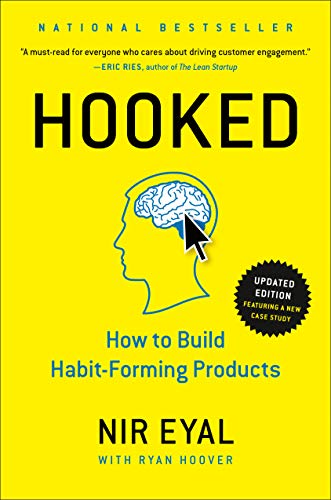
It’s not always the best products that go “viral” and capture widespread attention. Sometimes it’s the products that were specifically designed to keep you engaged.
In Hooked, Nir Eyal outlines a four-step process by which companies can (and do) guide human behavior in a way that consistently brings users back without having to rely on any additional advertising or marketing.
The Hooked model itself looks like this:
- Trigger – an internal or external cue that prompts the user to take action
- Action – the simplest behavior in anticipation of a reward
- Variable Reward – sustain user interest by satisfying their needs while leaving them wanting to re-engage with the product
- Investment – the anticipation of rewards in the future
According to Nir, these hooks, when properly executed, allow businesses to increase customer lifetime value, provide pricing flexibility, supercharge growth, and sharpen their competitive edge.
For more on hooks and how they can integrate with growth loops, check out our deep dive into acquisition loops.
2. Trust Me, I’m Lying: Confessions of a Media Manipulator – by Ryan Holiday
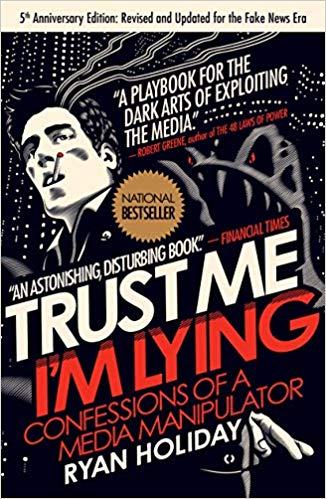
To understand how to best position a brand or client within the media landscape, it’s critical to have a deep understanding of how media truly works. Holiday’s book is a deep dive into exactly that, and unfortunately, the outlook isn’t pretty.
“Trust Me, I’m Lying” is essentially two books in one. The first half explains how blogs drive news and how they can be manipulated. The second part shows what happens when this is done, with examples we can all remember. When a media eco-systems primary KPI is attention and profit, media companies and marketers win, and readers lose.
According to Holiday, the former marketing director for American Apparel, “I wrote this book to explain how media manipulators work, how to spot their fingerprints, how to fight them, and how (if you must) to emulate their tactics. Why am I giving away these secrets? Because I’m tired of a world where trolls hijack debates, marketers help write the news, opinion masquerades as fact, algorithms drive everything to extremes, and no one is accountable for any of it. I’m pulling back the curtain because it’s time the public understands how things really work. What you choose to do with this information is up to you.”
While the book was meant to be a warning, it’s tough to read it and not come up with actionable ideas.
Ryan was also one of the first thought-leaders to recognize growth marketing and its future and wrote one of the earliest primers on the topic – Growth Hacker Marketing.
3. Contagious: Why Things Catch On – by Jonah Berger
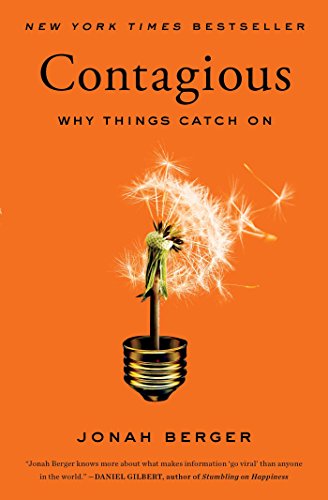
Think about the last thing you saw online that you immediately shared – YouTube video, NY Times article, meme, etc. What made you want to share that? What exactly was your motivation?
Jonah Berger, a marketing professor at the Wharton, studies how social influence shapes the decisions we make and why some things go viral, and others don’t. In Contagious, he outlines six factors that help make things go viral:
- Social Currency – how much social value do I gain by sharing this?
- Triggers – what internal or external cues will be associated with this?
- Emotion – what does this make me feel?
- Public – do I see people using this in the real world?
- Practical Value – what value am I getting out of this?
- Stories – what narrative can be latched onto this?
This book essentially picks up where Malcolm Gladwell’s “Tipping Point” left off, showing how ideas catch on in the digital age. The next time you create something with the hope of it spreading, take some time to strategize over how or why someone would be inspired to share it.
4. Influence: The Psychology of Persuasion – by Robert Cialdini
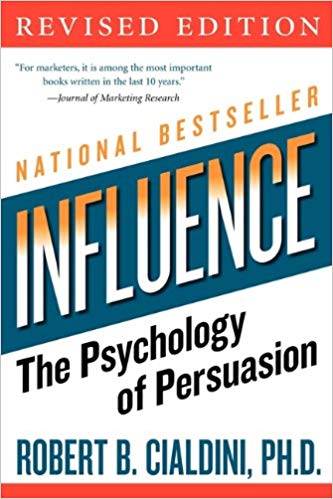
“Influence” is the culmination of Dr. Robert Cialdini’s 35+ years of research in influence and persuasion, looking into the psychology of what makes people say “yes.”
To him, there are six principles of persuasion. Understanding these will not only help you become a better persuader, but you’ll also become better prepared to defend when these tactics are used on you.
- Reciprocation: The internal pull to repay what another person has provided us.
- Commitment & Consistency: Once we make a choice or take a stand, we work to behave consistently with that commitment in order to justify our decisions.
- Social Proof: When we are unsure, we look to similar others to provide us with the correct actions to take. And the more people undertaking that action, the more we consider that action correct.
- Liking: The propensity to agree with people we like and the propensity for others to agree with us (if we like them).
- Authority: We are more likely to say “yes” to others who are authorities, who carry greater knowledge, experience, or expertise.
- Scarcity: We want more of what is less available or dwindling in availability.
In marketing, understanding human behavior and psychology are critical. Understanding Dr. Cialdini’s work will make your messaging better. Plain and simple.
5. This Is Marketing: You Can’t Be Seen Until You Learn to See – by Seth Godin
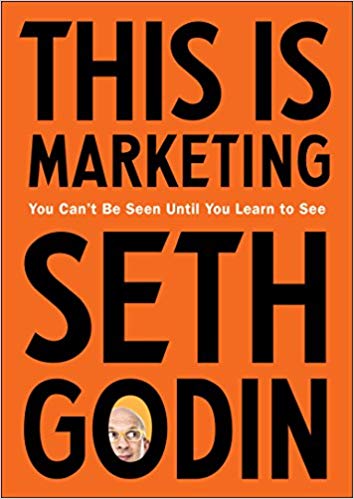
It’s not a list of best marketing books without something by Seth Godin. We really could have included any of his famous works (particularly Purple Cow or Permission Marketing) on this list, but “This Is Marketing” is essentially a culmination of his wisdom from his lifetime in marketing, so it’s as good a place to start as any.
Rather than giving technical advice, Seth’s writing is a bit more broad and philosophical. It looks at topics like the history of marketing and how mass media is less and less relevant or necessary in the digital age. His advice tends to gravitate around a similar theme of making things that are more personal. Rather than trying to tweak your copy or optimize some new tool, Seth’s advice tends to fall back on figuring out exactly who your product is for and what need it fulfills and then crafting your messaging specifically for them.
While the digital space is often fast-moving and tactical, Seth’s advice is more timeless and general. It’s often necessary for every marketer to be reminded that at the end of the day, we’re all trying to connect people with products that can help them. If solving problems is our goal, we can do it by making things we’re proud of.
6. Thinking Fast & Slow – Daniel Kahneman
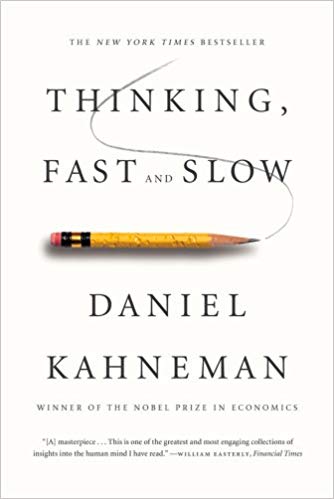
Daniel Kahneman is a psychologist and economist notable for his work on the psychology of judgment and decision-making. He also won a Nobel prize for his work in behavioral economics. So when someone of his background writes 600+ pages outlining everything he’s learned about human behavior, trust me when I say you’ll come out of it with something actionable.
The book covers a variety of topics that seems to touch on all aspects of human behavior, particularly irrational human behavior. He spends a lot of the book talking about “the two selves,” which is essentially a divide between conscious vs. unconscious thoughts and actions. This topic leads to heuristics, particularly why humans are so bad at thinking statistically, showing how and why both types of “selves” can be tricked.
It bears repeating that understanding psychology and human behavior is essential to marketing. Kahneman’s work will undoubtedly help with that, but it will also help with a more underrated trait that every marketer needs to have: empathy. Put yourself in the shoes of people who will be seeing your product or messaging for the first time. The results will speak for themselves.
7. Building a Storybrand: Clarify Your Message So Customers Will Listen – by Donald Miller
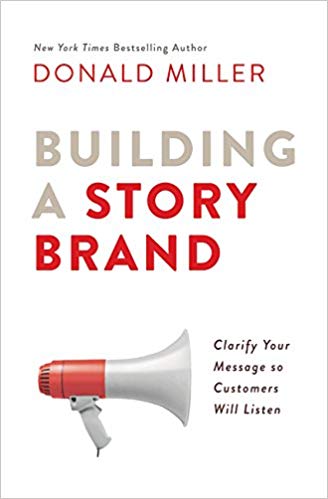
If you’ve ever struggled with getting consumers to respond to your messaging, it often helps to approach the problem with a different lens. If you listen to Donald Miller’s advice, try making your customer the hero of a story.
Miller breaks down “Building a Storybrand” into seven principles:
- The customer is the hero, not your brand.
- Companies tend to sell solutions to external problems, but customers buy solutions to internal problems.
- Customers aren’t looking for another hero; they’re looking for a guide.
- Customers trust a guide who has a plan.
- Customers do not take action unless they are challenged to take action.
- Every human being is trying to avoid a tragic ending.
- Never assume people understand how your brand can change their lives. Tell them.
It’s impossible to read this book and not reconsider how you’re positioning your brand to your customers. Is your messaging just a list of product features that you’re hoping will get a customer excited? Try recrafting those with the customer journey in mind, make them feel understood, and see how much the response changes.
8. Everybody Writes: Your Go-To Guide to Creating Ridiculously Good Content – by Ann Handley

Despite living in a digital age where more and more communication dwindles to acronyms, emojis, and GIFs, writing remains an important skill for anyone. When everyone has access to the same tools, your choice of words is one of the few areas where you can truly set yourself apart from the competition.
Ann Handley, chief content officer at MarketingProfs, covers all things writing in this book. But don’t worry – this isn’t just an updated version of “Elements of Style.” The lessons and rules apply across all of your online assets ― from web sites, to blogs, to email marketing offers, to Facebook and other social media.
Always remember to grab your readers’ attention early and that your first draft will always be ugly.
9. Range: Why Generalists Triumph in a Specialized World – by David Epstein
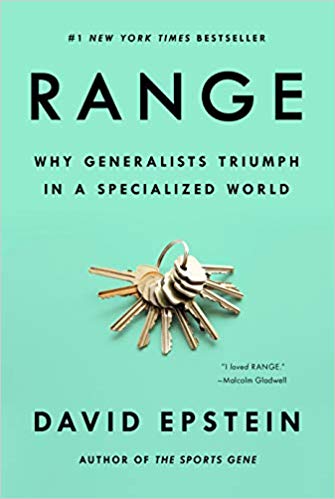
Range by itself isn’t so much a marketing book, but its premise helps establish or reinforce the framework of what a good growth marketer should be.
We live in a world where everyone works to become more and more specialized. People strive to become experts at solving a specific problem with a very narrow skill set. However, as the old saying goes, when all you have is a hammer, every problem looks like a nail.
In marketing, rarely are we solving the exact same problem over and over — the more general our knowledge-base, the more experiences and potential solutions we have to draw from. For example, sometimes, more paid media is the solution, but it isn’t always. The same goes for content, SEO, email, referrals, and on and on. Growth marketing is about finding unique solutions, so knowing the full landscape of tools and how they work together is essential. This means we need generalists in a world of increasing specialization.
Now, of course, we want to avoid having a knowledge-base that’s a mile wide but only an inch deep. Range reminds us to work towards developing into the T-Shaped Marketer that’s becoming more and more valuable on today’s marketing teams.
10. 22 Immutable Laws of Marketing: Violate Them at Your Own Risk – by Al Ries and Jack Trout
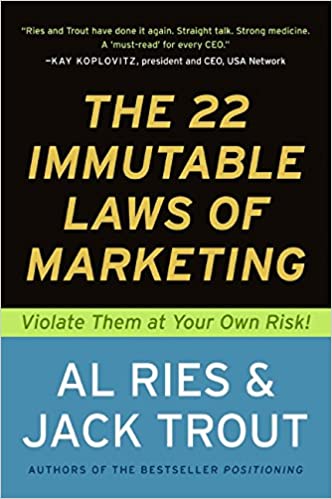
This book is probably the shortest read on this list at only 143 pages, but it’s almost impossible to read through Al Ries and Jack Trout’s decades of wisdom and not come away with a few actionable insights.
The advice in the book is more high level and less tactical, addressing challenges such as brand positioning (The Law Of The Category) and PR (The Law of Perception). One important thing to note is that many of the ideas in this book surround decisions that a company must make long before their product is released, as opposed to tactics applied after the fact to convince people to buy. Essentially, the laws in the book stress the importance of “product/market fit” long before it became the new buzzword.
It’s also worth noting that the book was released in 1994, so many of the examples and advice may seem a bit dated. This puts it upon the reader to see how these ideas can be applied in the current age. For example, the Law of Focus discusses owning a word in your prospect’s mind, which is an idea that can be tied into modern SEO strategy.
11. No Filter: The Inside Story of Instagram – by Sarah Frier
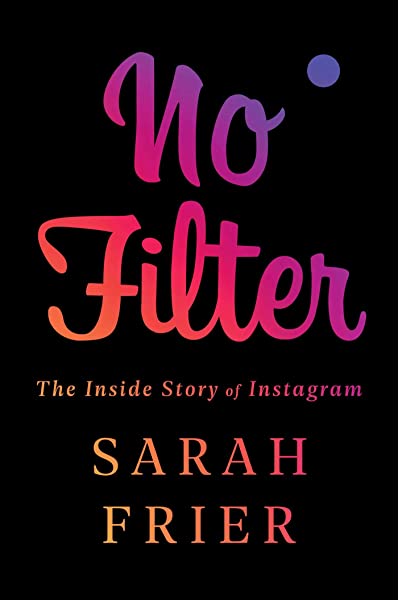
Long time tech reporter Sarah Frier offers the definitive story of Instagram and a compelling tale of how social media has transformed the lives of a new generation. The book is less action-oriented than some of the others on this list but for anyone who works with social media or social marketing, it should be essential reading. The book offers insight into Facebook’s heavy-handed focus on the “growth” of Instagram, as opposed to its future commitment to the product or the satisfaction of its users which has ultimately lead to the bloated Instagram app of 2021.
And if you needed any more reason to read No Filter the book was crowned the 2020 Business Book of the Year by the Financial Times and McKinsey.
12. The 1-Page Marketing Plan: Get New Customers, Make More Money, And Stand out From The Crowd – by Allan Dib
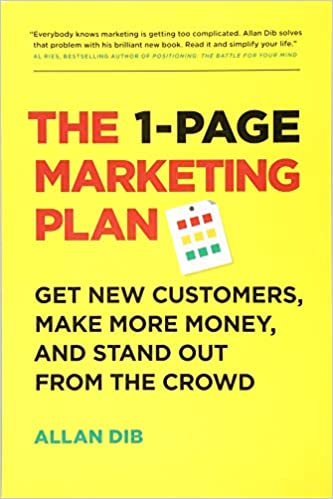
Almost any marketer that’s been in the business for a while is probably guilty of getting too caught up in the new shiny tactic at some point or another. Dib’s book is a reminder on how to simplify and still drive results.
The 1-Page Marketing Plan breaks down like this:
- Select your ultra-specific niche target market
- Craft a message your target market responds to
- Reach your prospects with advertising media
- Capture leads in an opt-in or a CRM
- Nurture those leads by following up
- Convert your prospect into a customer
- Create your tribe by delivering a world-class experience
- Increase your lifetime customer value
- Orchestrate and stimulate a targeted system for referrals
Everything else is just noise, or marketing for the sake of marketing. Once you have your plan set up, all marketing should tie back towards growing and optimizing one of these defines steps in your plan.






Necessary to compose you a quite little word to appreciate you yet again about the nice recommendations you’ve led here.
This post was truly worthwhile to read.